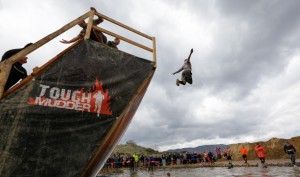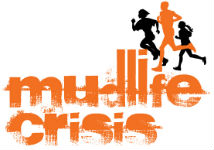
Obstacles like the Tough Mudder “Walk the Plank” have an element of risk that can make us more resilient and resistant to stress!
Is it possible participating in obstacle course racing is helping you deal with stress? I think most regular OCR athletes would answer that with a resounding “yes.”
Another podcast-inspired post today, this time from the Fat-Burning Man podcast. Host Abel James was interviewing Dr. Pedram Shojai, who I have mentioned before in relation to his new book The Urban Monk: Eastern Wisdom and Modern Hacks to Stop Time and Find Success, Happiness, and Peace, and they were talking about the book a bit. The Urban Monk, which I am reading right now, is mostly about trying to get our brains back into a state of relaxation so that we can handle the stress of the world.
Stress in the modern day: not what we’re adapted for
We’ve talked a lot about stress and evolution in the past, for sure. Stress, of course, is the body’s response to external stimuli – the “fight-or-flight” response versus the “rest-and-digest” one. When we are confronted with a stressor like a predator, or a natural disaster, or what have you, our body responds by shutting down things like digestion, immune response, and stuff that isn’t necessary for the situation, and sends all our energy into getting the heck out or fighting back. Adrenaline comes from here, as does a bit of gluconeogenesis (creating extra glucose out of protein and amino acids for quick energy). Once the problem has passed, we return back to the “rest-and-digest” mode.
The problem is that our modern day life is full of lots of tiny little stresses that elicit the same response from our bodies. But with the constant stresses, those “fight-or-flight” instincts and responses are always on, and those other key things are kept at bay, to our absolute detriment. So you hear lots of pundits talking about relaxation techniques to get out of “fight-or-flight” mode.
But this was a slightly different take on the topic as we weren’t hearing about things like meditation, deep breathing, navel-gazing, etc. (and there’s a place for all that, for sure). Instead, the discussion was about how partaking in higher-risk activities can make the “fight-or-flight” instincts be held more at bay, and that’s the reason that you frequently see military veterans, athletes, martial artists and combat sports participants, and action sports mavens who have a really “chill” look at the world.
When you partake in such activities regularly, and have faced potential life-and-limb threats, your body becomes used to the higher stress of those activities, and doesn’t respond as quickly or vehemently to smaller-level stresses. And this makes a lot of sense: say you’re something like a professional alpine skier, for example. Your daily routine includes a lot of stuff that could result in a broken body part (or just broken body, for that matter). If you don’t make that next turn, you could skid into a tree or over a cliff or what have you. Your idea of what is stressful is light years beyond the person who thinks that a traffic jam is stressful. And your body is going to react accordingly.
My experiences with risk and stress
I have always been called a pretty low-stress person. It takes a lot to rile me up, for sure. And as a kid, my parents let me do a lot of high-risk stuff. I was (still am, actually) a big tree climber. We used to go downhill skiing a lot. We hiked and climbed rocks. In college, when I was in ROTC, I attended US Army Basic Parachuting School (AKA Jump School) and jumped out of airplanes. I still get into that stuff. And I was always pretty chill as a kid. Sure, I had stuff that made me get upset, but it was pretty quickly shucked off.
And I see the stories coming out today of college kids who can’t handle being told by professors that they’re wrong about stuff, or that they think they’ve been repressed because someone disagreed with them, and wonder how many of those kids actually took on dangerous sports or activities. Or were they the products of helicopter parenting, never being allowed to take a risk because of what might happen?
I know part of that is just being a kid and seeing things as black and white, but a lot of it has stuck with me. I recall a time about 15 years ago when I was doing some winter hiking with a now-ex-girlfriend and she was in an absolute panic because she spotted some ice on one of the trails we were on, an uphill portion. She was literally clenching my hand in a near-death grip and when we got to the top of that section, she grabbed me and hugged me panicked, saying that the only thing she could imagine was falling, sliding down the path, and hitting trees and getting killed.
That declaration stuck with me, because not once has that sort of thing ever occurred to me.
But I think that’s a part of what attracts people to OCR and other higher-risk sports and activities: the feeling you get when you’re done. When you’ve climbed a 30-foot ladder with the rungs three feet apart, gone over the top and come down a few times; or climbed a rope over a mud pit; or swum through a brackish swamp that could possibly contain any poisonous creature in the world; it takes a lot to rattle you.
And you see this even more with people like military veterans – the high risk activities that many of them, particularly combat veterans, have undergone make them look at the ridiculousness that many of their non-veteran citizens spout as a real concern to them (like parking their cars, traffic, having the right suit on, etc.) and just roll their eyes.
(This is not to say that combat veterans haven’t had experiences that have caused them stress issues and still do today, by any means, but those stresses are nearly exponentially worse than anything that most of us can imagine and should be respected and aided whenever we can do so.)
So we’re going to add this to the reason to do OCR: reduce stress. Yes, training for an OCR reduces stress because exercise can do that. Community helps to reduce stress because we’re sharing our struggles with others (another evolutionary adaptation that we are losing in modern society, we’ll have posts on that another time). But just doing some really potentially dangerous stuff is huge.
Get out there and try this stuff. Change the way you see the world, and pass that on to your kids.






